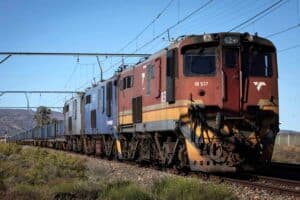Comes at a time when the logistics operator is undergoing major reforms to allow private operators access to ports and rail.

Ailing steel producer ArcelorMittal SA (Amsa) has hauled Transnet to the Competition Tribunal, accusing the state-owned rail and port operator of abusing its market dominance.
Transnet says the complaint of anti-competitive behaviour levelled against it was previously dismissed by the Competition Commission and has now been self-referred by Amsa to the tribunal.
“Transnet is opposing this self-referral and has filed papers accordingly with the Competition Tribunal,” says the logistics operator in a response to Moneyweb.
There were hints of disquiet in Amsa’s 2024 annual report when it singled out Transnet Freight Rail (TFR) as a key risk to the business that had disrupted production and output volumes, all the while increasing costs.
ALSO READ: Government still talking to ArcelorMittal while Seifsa identifies challenges
TFR missed more than 40% of its delivery targets in 2024, notes Amsa, which relies on rail for the shipment of iron ore to its mills.
Over the previous three years, rail tariff increases outstripped inflation.
Amsa, under pressure from customers and government, has deferred its decision to wind down its long steel business following a R1.7 billion loan facility from the Industrial Development Corporation (IDC). It also received a Temporary Employee Relief Scheme (Ters) grant to assist in funding employee costs, which will reduce the drawdown required against the IDC facility.
Amsa’s performance has been undercut by cheap foreign imports, rising logistics costs and electricity prices that have surged 835% since 2007.
ALSO READ: IDC saves ArcelorMittal days before furnaces switched off
Tribunal is ‘long shot’
The tribunal says Transnet has filed an exception application to Amsa’s complaint referral in which it seeks to dismiss the complaint on the basis that there is no case for it to answer, or that the key arguments are vague and embarrassing. An exception application is filed when one party in a dispute argues that the case is inherently defective in law.
“At this stage, the filing process is still underway and the merits of the main matter self-referred by Amsa must still be heard,” says the tribunal in response to questions from Moneyweb.
Transnet’s exception application must first be heard before the main arguments can be considered by the tribunal. “The Tribunal is yet to hear the matter once filing processes have been completed and will pronounce on its decision after hearing the merits of the complaint,” says the tribunal.
Moneyweb approached Amsa for comment but had not received a response by the time of publication.
A transport expert who asked not to be named tells Moneyweb that Amsa’s approach to the tribunal is a long shot, coming as it does at a time when the state is finally in the process of relinquishing its monopoly over port and rail infrastructure.
Port and rail infrastructure are being pried out of Transnet’s hands and placed under independent managers as a precondition for allowing private sector operators.
ALSO READ: Did government policy kill SA’s steel industry?
Debt in excess of R140bn
Transnet’s declining operational performance – which appears to have been arrested in 2024 – is a critical obstacle, alongside Eskom’s unstable grid, to faster economic growth.
Minerals Council SA reported R50 billion in export losses in 2022 due to TFR’s inability to ship sufficient ore to the ports.
In 2023, Exxaro was forced to find costlier alternatives such as road due to TFR’s rail capacity problems and lower coal prices.
Transnet reported a R7.3 billion net loss in 2024, up from R5.1 billion in 2023, driven by higher finance costs and a R9.1 billion provision for a court-ordered payout to Sasol and TotalEnergies for pipeline overcharges. Transnet is appealing the court order.
The company is saddled with debt in excess of R140 billion, which it is not in a position to repay without state assistance.
This article was republished from Moneyweb. Read the original here.






